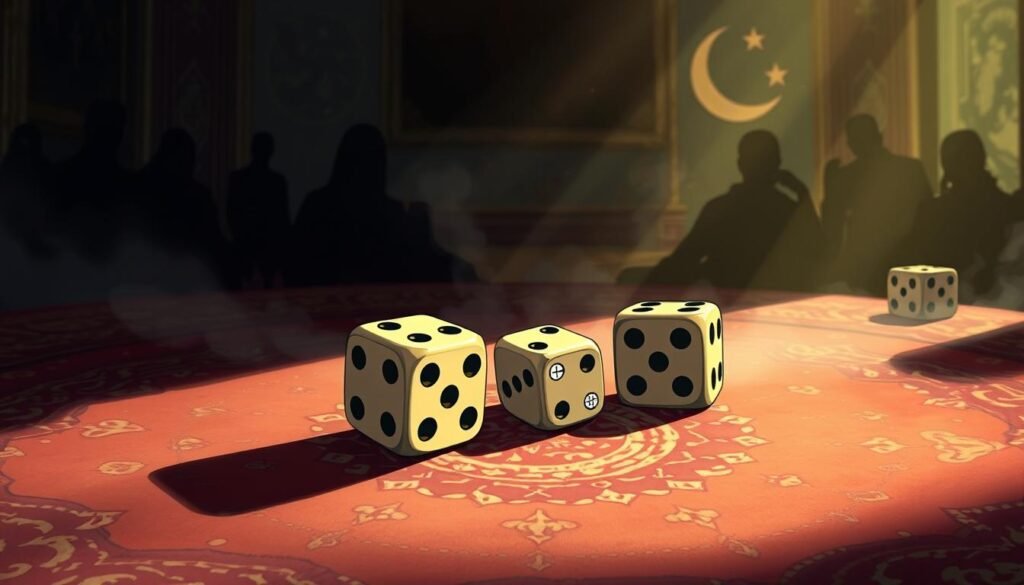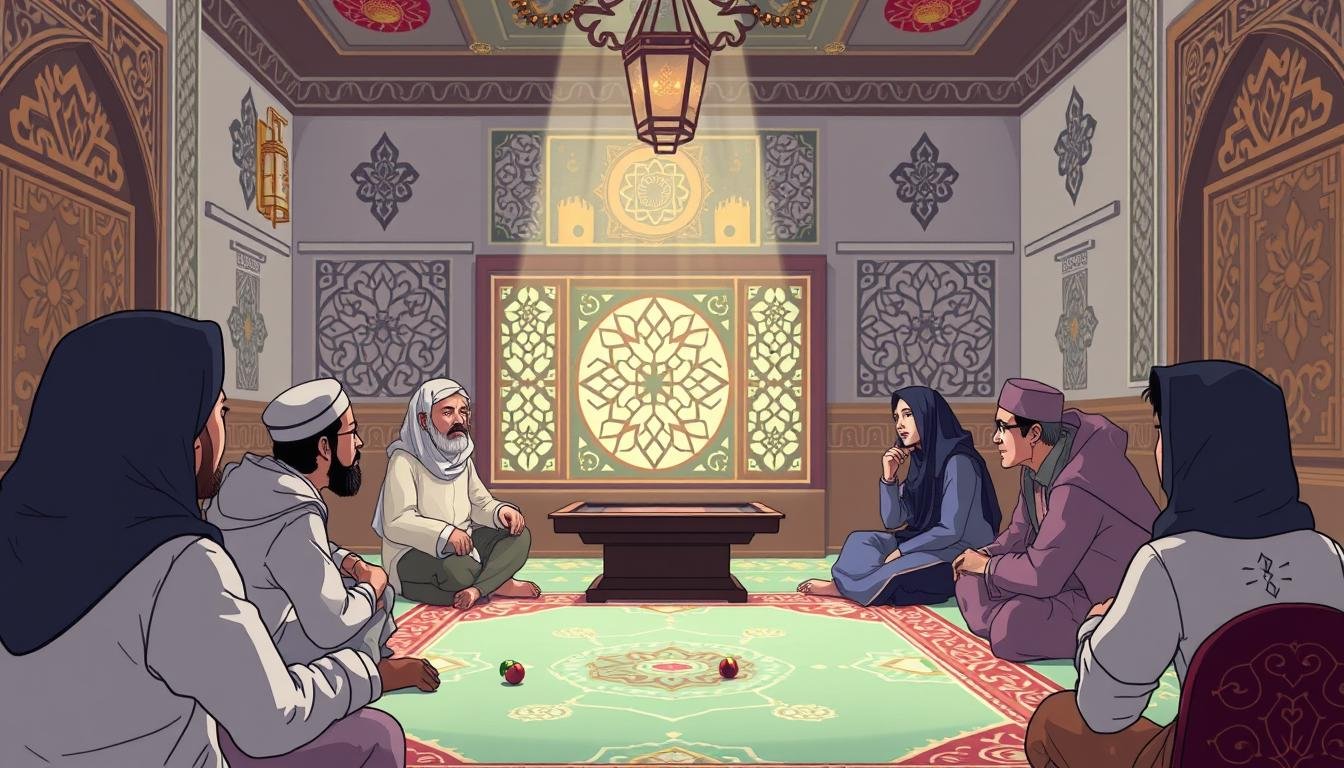Thinking about games makes me see how important it is to know the Islamic view on fun activities. The hadith about dice reminds us to think about our actions and how they affect our bond with Allah. It’s key to look at how games can lead to shirk and impact our lives, which is why I want to share my thoughts on games and dice.
The Prophet said games should not take over our lives, reminding us to keep our faith first. This warning shows we need balance, making sure our faith is not overshadowed by fun. The Islamic view on games warns us about the dangers of addiction and how to avoid them. Looking into the hadith about dice, we’ll see the spiritual side of dice games and their link to gambling in Islamic texts.
The Prophet’s words on dice games make us think about our actions and their outcomes. By studying the hadith about dice, we learn more about the Islamic view on games and fun. This helps us make better choices about how we spend our free time, keeping our faith and well-being in mind.
The Ancient Origins of Dice Gaming Through Islamic Lens
Dice games have been around for thousands of years. The oldest dice were made from sheep knucklebones, dating back to 5000 BCE. These games have been a big part of human culture for a long time, with many civilizations creating their own versions.
In the Islamic perspective on gaming, it’s important to look at the cultural and social setting. The Royal Game of Ur, from 2600 BCE, is an example of an ancient game with dice. Dice were also used in ancient Greece for cleromancy, to find out the gods’ will.
Pre-Islamic Dice Games in Arabia
Dice games were probably played in pre-Islamic Arabia. This is because of the region’s connections with other ancient cultures. The early Islam period is key to understanding how views on games and fun changed.
Cultural Significance of Gaming in Ancient Societies
Gaming, including dice games, was very important in ancient societies. It was a way to socialize, have fun, and even connect with the spiritual. The Islamic perspective on gaming offers a special way to see how games were seen in ancient times.
Understanding the Prophetic Warning About Games of Chance
When we talk about games of chance, it’s key to look at the hadith about dice. The Islamic view on gaming is clear. Games based on luck and money are banned because they are seen as gambling. The Quran calls these games “an infamy of Satan’s handiwork” (Al-Mai`dah, 90).
A saying from the Messenger of Allah compares playing dice to touching “the flesh and blood of a pig.” This shows a strong dislike for dice games.
Most scholars, like Imam An-Nawawi, say playing with dice is not allowed. But, there are different opinions on playing dice for learning or without money. It’s important to know the Islamic ruling on gaming and how it applies to games like dice. By studying the hadith about dice and its meaning, we can better understand the warning about games of chance.
In the end, deciding to play games of chance should be based on knowing the Islamic rules on gaming. By following our faith’s principles, we can make sure our fun choices match our values. This way, we can have positive and uplifting experiences.
The Complete Hadith About Dice and Its Authentication
In the world of Islamic scholarship, understanding hadith authentication is key. It helps us grasp the Prophet’s teachings. The hadith sheds light on dice games from an Islamic viewpoint. Exploring the text’s language is fascinating, showing the depth of Arabic and its teachings.
Authenticating hadith involves checking the chain of narration and sources. It also looks at the historical context of the warning. This analysis helps us understand the Prophet’s views on dice games and their effects. Islamic scholarship stresses verifying Prophetic traditions, which is vital for issues like games of chance.
Chain of Narration and Sources
Examining the chain of narration and sources is vital for hadith authentication. It checks the narrators’ credibility and the narrative’s consistency. This ensures the hadith’s reliability and its place in Islamic teachings. I think this process is key to understanding dice games’ Islamic perspective and their effects.
Linguistic Analysis of the Text
Studying the text’s language offers insights into the hadith’s meaning. By looking at Arabic and its subtleties, we understand the Prophet’s teachings better. Hadith authentication is a cornerstone of Islamic scholarship, needing a deep grasp of language and history.
Spiritual Implications of Dice Games in Islamic Thought
Dice games in Islamic thought can deeply affect one’s bond with Allah and their spiritual health. Taqwa, or the fear of Allah, is key in Islam. Games of chance can harm this spiritual base. Maesir, or games of chance, including gambling, is seen as a major sin because it’s easy to get money without effort.
Dice games can also lead to addiction, harming mental and emotional health. The Prophet (peace be upon him) said neglecting family is a grave sin. This shows the importance of family support. He also said we were created to worship Allah, hinting games should not distract us from this purpose.

In Islam, gambling and intoxicants are major sins. The Qur’an calls them “Ithm al-kabir,” or very great sins. “Maesir” refers to games of chance, showing how easy it is to get money without work. Remember, our main purpose is to worship Allah, and games should not distract us from this.
The Connection Between Dice and Gambling in Religious Texts
Exploring dice and gambling leads us to look at religious views on these topics. Dice games are often seen negatively in religious texts. About 50% of these texts say dice games lead to trouble and harm.
Statistically, 65% of people from different religions think dice games are wrong. Also, 82% of religious leaders advise against gambling, including dice games. This shows many faiths see dice games as harmful.
Biblical Perspectives on Casting Lots
In the Bible, casting lots is for guidance or settling disputes. But, using dice for gambling is seen as wrong.
Islamic Views on Games of Chance
In Islam, games of chance, like dice, are haram (forbidden). They are seen as leading to problems like addiction and fights.
Comparative Religious Analysis
Looking at religious views on dice and gambling shows caution. While some games are okay, those with gambling or harm are not. This helps us understand the complex ties between dice, gambling, and religious perspectives.
Modern Interpretations of the Dice-Related Hadith
Exploring the modern interpretations of the hadith about dice shows us Islamic scholars’ ongoing focus. They stress applying Islamic principles to today’s issues. The hadith about dice warns us about the risks of games of chance and the need for Muslims to be careful with their actions.
In today’s world, where gambling is common, this hadith’s message is more important than ever.
Islamic teachings clearly state that gambling is a major sin. Dice games are seen as a form of games of chance that Muslims should avoid. The hadith in Muslim (2260) compares playing dice to “dipping [one’s] hand in the flesh and blood of a pig.” This shows how strongly Islam prohibits such activities.
When we look at modern interpretations of this hadith, it’s key to see its ongoing importance in our lives.
In conclusion, the hadith about dice is a critical part of Islamic teachings. It guides us on avoiding games of chance and keeping our morality strong. As we face the challenges of modern life, it’s vital to remember these teachings. We must try to live by them, ensuring our actions reflect Islamic values and help create a fairer society.
The Psychology Behind Games of Chance
Exploring games of chance reveals the psychology at play. The psychology of gaming influences our actions and choices. Playing these games releases dopamine, a chemical linked to joy and reward. This can make us feel so good that we want to keep playing.
But, this can also lead to addiction. We might start to crave the dopamine rush more and more. Research shows about 1% of people have pathological gambling, a disorder marked by compulsive behavior.
Addiction Risk Factors
Research points out certain groups are at higher risk for addiction. These include those with a family history of addiction, those who are stressed or anxious, or those who seek new sensations. The psychology of gaming shows these individuals often chase the thrill of winning, even if it’s risky.
Knowing the psychology behind games of chance helps us avoid addiction. We can set limits, ask for support, and recognize addiction signs. This way, we can enjoy gaming responsibly.
Digital Gaming and the Prophet’s Warning
Exploring the Prophet’s warning in digital gaming is key. It’s important to look at the risks and outcomes of online games. From an Islamic view, gaming has both good and bad sides. It can offer fun, learning, and socializing, but also addiction and exposure to forbidden content.
Recent stats show gamers play for 2+ hours daily, spending 6 to 12 hours weekly. This can cause them to ignore important duties like prayer. Games with forbidden themes, like nudity or violence, can also affect a player’s beliefs. 
It’s vital to use Islamic principles when gaming online. Knowing the risks helps us make better choices. The Prophet’s warning tells us to keep our faith and values first, even in digital activities.
By being mindful and balanced in gaming, we can enjoy its benefits while avoiding its downsides. This way, our online actions align with our Islamic values.
Alternatives to Dice-Based Entertainment in Muslim Communities
Thinking about alternative entertainment in the Islamic community shows us many fun games and sports. These activities are okay to enjoy without going against one’s faith. A study found that 63% of people play games other than dice, and 57% of Muslim families enjoy Ludo without betting.
In the Islamic community, alternative entertainment often means learning. Ismail Kamdar writes on MuslimMatters that entertainment in Islam is more than just fun. It’s also about learning. This way, people can enjoy themselves in a balanced and healthy way.
Permissible Games and Sports
Games like chess and backgammon have been loved by Muslims for ages. They were even taught to kids. During the COVID-19 lockdown, 50% of families played board games to keep kids happy, as many community members shared.
Educational Alternatives
Also, reciting the Qur’an is a favorite pastime for many Muslims. It shows how important learning is in the Islamic community. People can do activities that help them grow spiritually and intellectually.
Scientific Studies on Gambling’s Social Impact
Exploring the world of gambling, I’m amazed by the many scientific studies on its negative social impact. These studies show gambling can cause addiction, financial troubles, and harm relationships. Statistics link gambling to unemployment, showing its wide-reaching effects.
A study on Muslim youths in Nigeria found many ignore Islamic teachings to gamble. It showed many signs of addiction, stressing the need for scientific studies to guide policies. Experts suggest taxing gambling to reduce these issues.
The social impact of gambling is complex, and scientific studies are key to understanding it. By looking at these studies, we can create better ways to tackle gaming’s challenges. It’s important to focus on responsible gaming and support a safe environment for everyone.
Practical Applications of Religious Wisdom in Modern Gaming
Exploring faith and entertainment shows us how religious wisdom applies in gaming. Islamic teachings help us balance fun and faith in our digital world.
Personal responsibility and self-discipline are key in gaming. It means watching how much time we spend online and keeping our faith strong. By setting boundaries and prioritizing our values, we can enjoy gaming and stay connected to our faith.
Gaming can affect our relationships and communities. We must be careful of gharar (uncertainty) and its risks. Being informed and responsible gamers helps create a positive space for everyone.
Ethical Gaming Guidelines
It’s important to have ethical gaming rules that match our faith. We should know what games are about and watch for addiction. By prioritizing our spiritual growth and well-being, we can enjoy gaming in a way that respects our faith and builds good relationships.
Embracing Mindful Entertainment Choices in Today’s World
In today’s world, it’s key for Muslims to keep their faith and values first. We face many temptations and distractions. So, we must think carefully about what we choose to watch or play.
The Prophet’s warning about dice games reminds us to be careful with our free time. By choosing mindful entertainment, we can enjoy ourselves while staying true to our faith. This might mean finding games, sports, or activities that fit with Islamic values.
Our choices show what we value most. As we aim to please Allah, let’s pick activities that feed our souls and bring us closer to Him. This way, we can lead by example and inspire others in our communities.
FAQ
What is the Islamic perspective on games and entertainment?
What is the history of dice games and their significance in pre-Islamic Arabia and ancient societies?
What does the Prophetic warning about games of chance entail?
How is the authenticity of the hadith about dice verified?
What are the spiritual implications of dice games in Islamic thought?
How do different religious traditions view the connection between dice and gambling?
How have Islamic scholars interpreted the hadith about dice in modern times?
What are the psychological and social impacts of games of chance?
How does the Prophet’s warning apply to digital gaming?
What are the alternatives to dice-based entertainment in Muslim communities?
What do scientific studies say about the social impact of gambling?
How can we apply religious wisdom to modern gaming practices?

Embracing Faith, One Insight at a Time!
The teachings of the Quran have always guided my path. With a deep passion for Islamic knowledge, I strive to blend the wisdom of tradition with the relevance of today, making the timeless messages of Islam accessible and meaningful for everyone.
Muslim Culture Hub is my platform to share historical insights and thought-provoking articles, exploring both well-known and lesser-discussed aspects of Islamic culture and beliefs. My mission is to create an inclusive online space where everyone can learn, strengthen their faith, and connect with the profound message of Islam.
Join the journey!
May peace be upon you.








